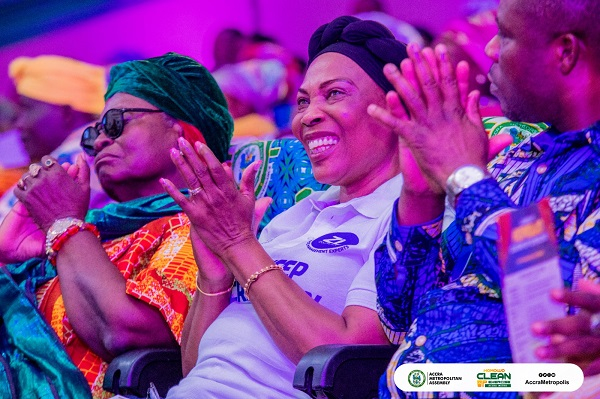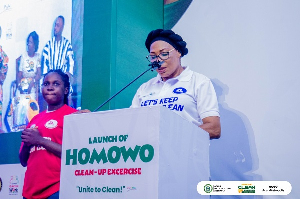An initiative to address pressing sanitation challenges in the Greater Accra Region and promote a cleaner environment ahead of the annual Homowo festival has been launched.
Launched at the Accra Metropolitan Assembly (AMA) under the theme "Unite to Clean," the initiative, dubbed the "Homowo Clean-Up Exercise and Asafoatse Sanitation Taskforce,” is scheduled to commence on July 2 and run until August 20, 2024.
The initiative, spearheaded by the Greater Accra Regional Coordinating Council (GARCC) in collaboration with the Ga Traditional Council (GTC) and supported by the Ministry of Local Government, Decentralization, and Rural Development, the Ministry of Sanitation and Water Resources, the Ministry for Environment, Science, Technology, and Innovation, and Zoomlion Ghana Limited, will begin in the Accra Metropolis, specifically Ga Mashie, and extend to the Korle Klottey Municipal Assembly, among other assemblies in the region.
His Royal Majesty, King Tackie Teiko Tsuru II, who officially launched the 2024 Homowo Clean-Up Exercise, called for collective action and responsibility in addressing environmental degradation across the Greater Accra Region.
The King outlined expectations for the clean-up exercise, noting that all shops and businesses in the designated areas would be closed on the day of the event, urging all leaders of various groups and associations, as well as all residents, to fully participate.
King Tackie Teiko Tsuru II urged residents to adhere strictly to sanitation bylaws and called for violators to face the full rigors of the law without external interventions.
The King also appealed to corporate bodies to adopt healthy green policies and beautify the capital, while calling on the Advertising Association of Ghana (AAG) to work with local authorities to declutter billboards and remove unauthorized advertising materials to improve the city's aesthetics.
He urged the assemblies to provide refuse bins at strategic points to discourage littering and to intensify public education and communal labor activities while enforcing environmental laws.
In her opening remarks, the Mayor of Accra, Elizabeth Kwatsoe Sackey, noted that the Greater Accra Metropolitan Area generates approximately four thousand metric tonnes of municipal waste daily, a figure that is expected to rise with the growing population and economic activities, hence the "calls for more pragmatic measures to be put in place to ensure that His Excellency, President Nana Addo Dankwa Akufo-Addo’s vision of seeing Accra become the cleanest city in Africa becomes a reality."
She expressed optimism that the initiative would rekindle both individual and collective commitments to proper sanitation practices and assured that the MMDAs would ensure the sustenance of the clean-up exercise beyond the Homowo Festival.
The Greater Accra Regional Minister, Daniel Nii Kwartei Titus-Glover, detailed the resources mobilized for the campaign, including 30 compaction trucks, over 30 motorized cycles (Borla Taxis), and various cleaning equipment.
He also mentioned the deployment of approximately 1,500 security personnel and a dedicated task force comprising Asafoatsemei, Environmental Health Officers, and community members to enforce sanitation regulations and uphold cleanliness standards.
"Let us roll up our sleeves, equip ourselves, and pledge to make a lasting impact. Together, we can achieve our vision of making Accra one of the cleanest cities in Africa," he said.
Lydia Seyram Alhassan, Minister of Sanitation and Water Resources, reaffirmed the government's dedication to making Accra the cleanest city in Africa.
The Minister mentioned the establishment of a sanitation committee tasked with overseeing sanitation activities, fostering community involvement, and ensuring sustainable practices in various municipalities.
Present at the gathering were traditional authorities, policymakers, Members of Parliament (MPs), civil servants, sanitation ambassadors, and religious leaders, among others.

Regional News of Tuesday, 25 June 2024
Source: AMA

















